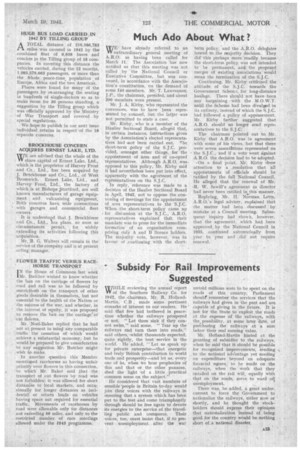Much Ado About What ?
Page 17

If you've noticed an error in this article please click here to report it so we can fix it.
WE' have aheady referred to an Vi' extraordinary general meeting of A.R.O. as having been called for March 11. The Association has now notified us that this meeting was not called by the National Council or Executive Committee, but was convened, in accordance with the Associa• tion's constitution, on the demand of some 140 members. Mr. T. Lawrenson-, J.P., the chairman, presided, and about 200 members were present.
Mr. J. A. Kirby, who represented the convenors, was to have been represented by counsel, but the latter was not permitted to state a case.
Mr. Kirby, who is a member of the Haulier Sectional Board, alleged that, in certain instances, instructions given by the Association's elected representatives had -not been carried out. The short-term policy of the S.J.C. provided, amongst other things,. for the appointment of area and of co-opted representatives. Although A.R.O. was. opposed to this policy, Mr. Kirby said it had nevertheless been put into effect, apparently with the agreement of the representatives on the S.J.C.
In reply, reference was made to a decision of the Haulier Sectional Board in April, 1942, not to oppose the convenfrig of meetings for the appointment of area representatives to the S.J.C. When the short-term policy came up , for discussion at the S.J.C., A.R.O. representatives explained that their mandate was to press for the immediate fcirrnatiou of an organization comprising duly A and B licence holders. The majority vote, however, was in favour of .continuing with the short term policy, and the A.R.O. delegates bowed to the majority decision. They did this perhaps more 'readily because the short-term policy was not intended to be permanent, and the proposed merger of existing associations would mean the termination of the S.J.C.
Continuing, Mr. Kirby criticized the attitude of the S.J.C. towards the Government Scheme, for long-distance haulage. There should not have been any bargaining with the M.O.W.T. until the Scheme had been divulged in its entirety, instead of which the S.J.C. had followed a policy of appeasement. Mr. Kirby further suggested that A.R.O. should no longer send representatives to the S.J.C.
The chairman pointed out to Mr. Kirby that A.R.O. was in agreement with some of his views, but that there were seven associations represented on the S.J.C., and if a vote went against A.R.O. the decision had to be adopted.
• On a final point, Mr. Kirby drew attention to a resolution that all appointments of officials should be ratified by the full National Council. He alleged that the renewal of Mr. -R. W. Sewill's agreement as director had never been ratified in this manner.
Replying, Mr. II. Norman. Letts. A.R.O. 's legal adviser, explained that the matter had been discussed by mistake at a Council meeting. Subsequent inquiry had show h, however, that the agreement. which had been approved, by the National Council in 1935, continued automatically from year to year and •Aid not require renewal.




















































